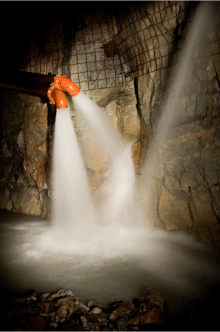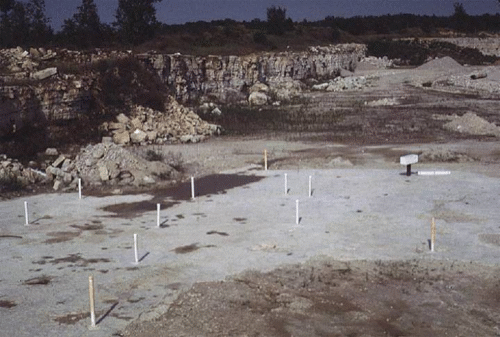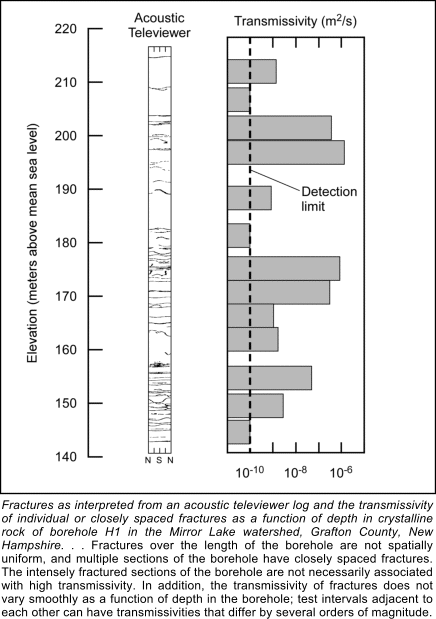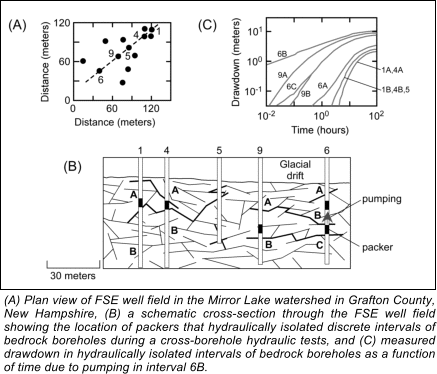On-Demand Webinars
INTERPRETING AQUIFER TESTS IN FRACTURED ROCK
 Interpreting aquifer tests in fractured rock can be problematic Interpreting aquifer tests in fractured rock can be problematic
Fractured rock aquifers are one of the most complex geologic settings in which to characterize groundwater flow and chemical transport. Fractures are non-uniformly distributed because of lithologic conditions and the local and regional stress distribution. Hydraulic properties of fractures can vary over orders of magnitude, yielding convoluted groundwater flow paths over dimensions from meters to kilometers.
Check Your Conceptual Model
Aquifer testing is an integral part of site characterization used to conceptualize aquifer heterogeneity and quantify formation properties governing groundwater flow. Learn how the proper design of aquifer tests in fractured rock can be used to characterize the complex spatial distribution of fracture hydraulic properties and/or the bulk hydraulic properties of large volumes of the rock formation.
Understand Limitations of Analysis Techniques
Concepts and assumptions synonymous with porous media aquifers are often used to interpret aquifer tests in fractured rock. In some instances, these assumptions are perfectly acceptable; however, in other instances, these concepts and assumptions lead to erroneous interpretations. Learn the limitations of various approaches for evaluating aquifer tests in fractured rock (including the application of numerical models).

Photo Courtesy of Maureen Muldoon
This webinar will highlight:
- ...hydraulic complexities associated with fractured rock aquifers, including the variability of igneous, metamorphic, and sedimentary rocks and and karst formations...
- ...designing aquifer tests in fractured rock aquifers to characterize groundwater flow paths and bulk hydraulic properties...
- ...applying classical porous media interpretations to aquifer tests in fractured rock � when are they appropriate and when will they lead to errors?
- ...application of numerical models to the interpretation of aquifer tests in fractured rock � what level of detail is necessary?
- ...numerical models are powerful tools for characterizing complex geologic settings, but they are not always needed to address project objectives...
Participants in this webinar will...
- ...recognize characteristic responses of aquifer tests in fractured rock that provide insight into conceptual models of aquifer heterogeneity
- ...appreciate that conceptual models of aquifer heterogeneity stream line site characterization and monitoring
- ...recognize the limitations of analytical and numerical interpretations of aquifer tests in fractured rock
- ...receive summaries of key tools, articles, and other resources commonly applied in the interpretation of aquifer tests in fractured rock


What makes this webinar different from other aquifer testing webinars:
Interpretations of aquifer tests are often conducted by attempting to "shoe-horn" data into pre-conceived conceptual models or analytical solutions to arrive at estimates of aquifer properties. Because of the geologic complexity of fractured rock aquifers, this practice can often lead to erroneous interpretations. This webinar focuses first on the visual interpretation of hydraulic responses from aquifer tests in fractured rock with the intention of conceptualizing aquifer heterogeneity. The choice of whether to make the next step and estimate aquifer properties and their spatial distribution will depend on project objectives. In some instances, classical analytical solutions commonly used in the interpretation of aquifer tests in unconsolidated porous media can be applied to fractured rock, but if they used inappropriately, they will lead to significant errors in interpretation. In many instances, more complex interpretive tools are needed to analyze aquifer tests in fractured rock, but it is necessary to recognize the degree of geologic detail that is warranted in explaining the hydraulic responses.
What content is new and exciting in this webinar?
Designing and interpreting aquifer tests in fractured rock cannot be conducted with your brain on "auto-pilot." One cannot just drop a pump down a well and monitor responses at a variety of locations with the intention of achieving information that is pertinent to the characterization of a fractured rock aquifer. The design and interpretation of aquifer tests in fractured rock is a challenging endeavor, where geologic insight shares equal importance with the interpretation of groundwater hydraulics.
 Allen M. Shapiro, Ph.D. Allen M. Shapiro, Ph.D.
U.S. Geological Survey
Dr. Allen Shapiro has authored numerous papers on field investigations in karst and various types of fractured rock aquifers, as well as being active in the development of methods of quantifying properties that govern groundwater flow and chemical transport in fractured rock aquifers. Dr. Shapiro has also patented equipment used to conduct aquifer tests and monitor groundwater chemistry in fractured rock.
Dr. Shapiro is a Senior Research Hydrologist with the National Research Program (NRP) of the U.S. Geological Survey (USGS). His research has focused on the development of field techniques and equipment, and methods of integrating and interpreting geologic, geophysical, hydraulic, and geochemical information in the characterization of fractured rock aquifers. Dr. Shapiro has described fundamental processes of ground water flow and chemical transport that are unique to geologic environments characterized by significant heterogeneity. He has also investigated the effect of scale on the hydraulic and transport properties of fractured rock through carefully designed field testing and modeling investigations conducted over physical dimensions of meters to kilometers. Dr. Shapiro is currently active in the characterization and remediation of various contaminants in fractured rock, including groundwater contamination by Dense Non-Aqueous Phase Liquids (DNAPLs).
Dr. Shapiro was the 2004 National Ground Water Association (NGWA) Distinguished Darcy Lecture and is an associate editor of the journal Ground Water, and he holds a Ph.D. from Princeton University in Civil and Geological Engineering.
| Fee: |
299.00 USD Per Webinar
|
| Materials and Downloads: |
Session Slides (PDF)
Additional MaterialsRecord of Attendance Form (PDF)
|
Number of
Participants: |
AS OF JUNE 1, 2020, WEBINARS ARE PRICED FOR INDIVIDUALS WORKING ALONE. Pricing is discounted for individual registrations for people working alone.
|
Continuing
Education
Certificates: |
$14.95 each. Official CEU certificates are available as an option. After successful completion of this webinar, a link will be provided to order a certificate.
|
| Access: |
On-demand, anytime 24/7. |
| Discounts: |
Buy 3 on-demand webinars, and get 3 on-demand webinars for free!
|
| Duration: |
90 minutes |
| PDH Earned: |
1.5 hours |
| |
|
| Instructor(s): |
Allen M. Shapiro, Ph.D. |
|
Become A Member
It's Free, It's Easy and as a
Member you'll enjoy...
- Exclusive Videos
- Special Pricing
- And Much More
|
|
Join
|
Learn More
|
Association of Environmental
& Engineering Geologists
|